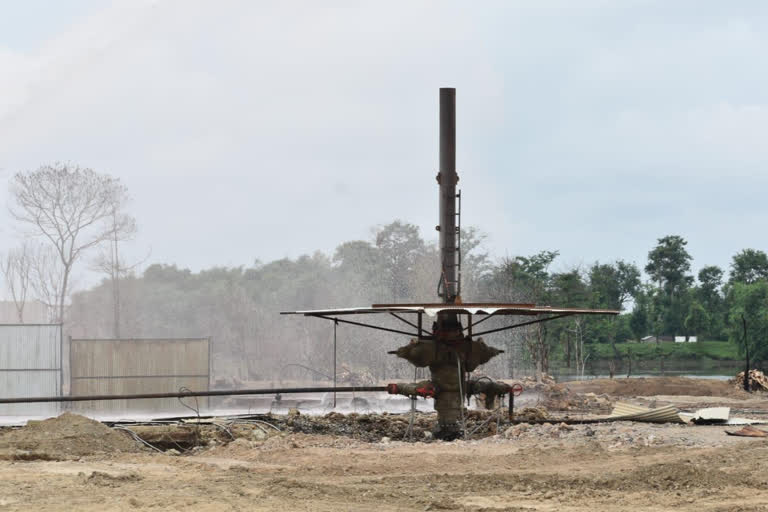Guwahati: The raging oil well fire in Assam which continued for more than three months has been largely controlled and it would take a few more weeks to fully control the gas leakage and fire, state-owned Oil India Limited (OIL) officials said on Sunday.
"The natural gas at well number five at Baghjan has been diverted partly into production and partly flared in two flare pits. The main aim of this operation is to reduce wellhead pressure of the blowout well which will help in the next action for killing the well. The oil well fire and gas leakage are largely controlled, and it would take some more time to fully control the situation. Foreign experts, firefighters and OIL engineers are working in a war footing to control the situation," OIL spokesman and Deputy General Manager Tridiv Hazarika told reporters.
Natural gas and oil condensate started leaking from an oil well of the state-owned OIL field at Baghjan in eastern Assam's Tinsukia district 110 days back. The leakage caught fire 97 days back on June 9. Hazarika said with the purpose of reducing the surface-level wellhead pressure of the blowout well number five at Baghjan, the process for restoration of diversion of the flow of gas from the wellhead to Baghjan EPS (Early Production Setup) and two flare pits was successfully implemented on Sunday.
He said the operation was carried out after foreign experts and OIL engineers completed the checking and inspection of the wellhead and safety inspection along with specific job safety analysis of the entire system on Saturday.
"The flow of gas was diverted to EPS on Sunday morning after closing the BOP (Blowout Preventer) and flaring part of the gas which was diverted to two flare pits," the OIL official added.
Assam's Commerce and Industry Minister Chandra Mohan Patowary said in Guwahati last week that a team of experts from Canada with all modern equipment was on the way to Baghjan to "kill" the well through "snubbing technology".
"After carrying out preparatory works, the Canadian experts may take six to eight weeks to plug the gas leakage and douse the fire," the minister said.
"The OIL experts and engineers are also working to control the well at least temporarily by diverting the gas flow through a diverter and then generating natural gas through two parallel lines," he said.
As many as 3,000 families have been shifted to 14 relief camps and the OIL along with the state government was providing relief to them, Patowary added.
READ: Assam: Blow out preventer to be placed over Baghjan gas well head
American and Canadian experts and engineers, who were associated with a Singapore-based firm M/S ALERT, firefighters, NDRF personnel and OIL and ONGC (Oil and Natural Gas Corporation) engineers were continuing their efforts to check the gas leak and douse the good fire at Baghjan.
Another OIL official who refused to be named said besides the recent floods and hostile weather, experts, engineers and workers have been facing numerous other problems in putting out the fire and capping the gas leak at Baghjan, nearly 550 km east of Guwahati.
Till now since May 27, a huge amount of crude oil and natural gas have been lost as a section of agitators continue with their protests for higher compensation and on other issues at a few locations in Tinsukia district.
Though some of the agitators called off the protests and lifted the road blockades, others continue to demand higher compensation for the affected people and hold OIL responsible for the mishap. OIL has till now provided Rs 30,000 to each of the affected families and arranged shelter and relief for them.
OIL officials said transportation of consignments comprising heavy machinery and equipment from Rajahmundry (Andhra Pradesh), Vadodara (Gujarat) and other places was delayed due to Covid-19 protocols and standard operating procedures (SOPs) which are in place.
However, the Army has built a 150-metre bridge over a water body to facilitate technical work to control the gas leak and oil well fire following a request from Tinsukia Deputy Commissioner Bhaskar Pegu.
Environmentalists and local people said the fire had left a trail of devastation in the adjoining areas, including the Dibru-Saikhowa National Park. Farms with standing crops as well as ponds and wetlands in the adjoining villages have also been affected.
Various NGOs and government bodies, including The Energy Research Institute (TERI) have been conducting environmental and pollution studies in view of the fire and gas leak. TERI was also arranging drone cameras for aerial photography and videography of the affected areas and surveys were being carried out depending on the weather conditions.
READ: Fire at OIL's Baghjan well likely to continue for two more months: Govt
IANS



